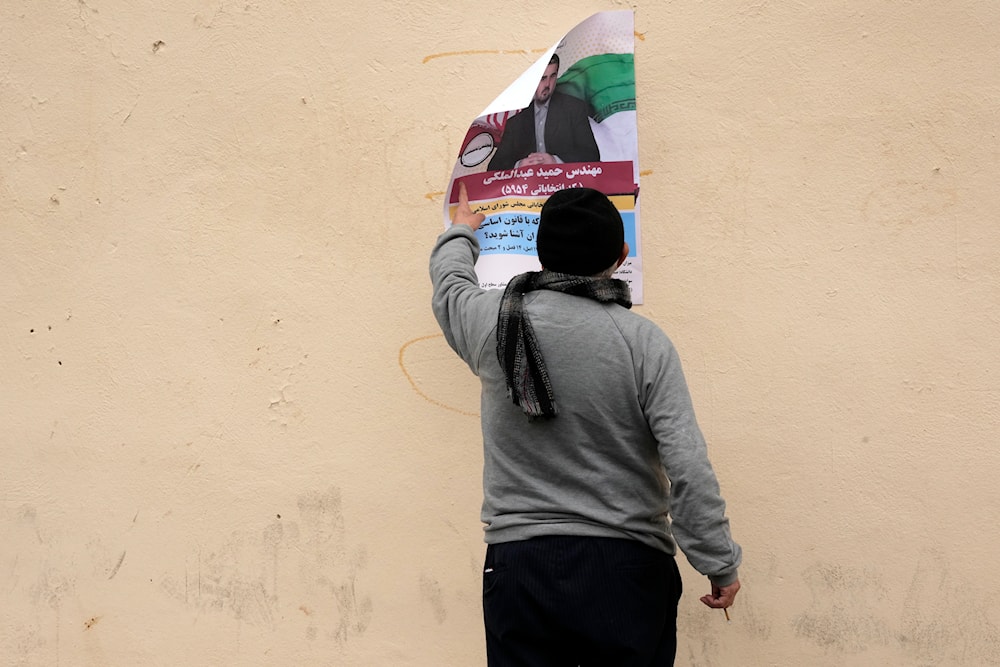Iran's parliamentary election campaigns launch 1 week before polls
Jurists responsible for the vetting process have approved around 15,200 candidates competing for the legislature's 290 seats.
-

A man looks at an electoral poster of Hamid Abdolmaleki, a candidate for the March 1 parliamentary election, in Tehran, Iran, Thursday, Feb. 22, 2024. (AP)
One week ahead of polls, campaigns from candidates running for Iran's upcoming parliamentary elections have kicked off and will run until February 29, a day before polls open.
Voters are due to cast their ballots on March 1 to select new members of Parliament and the Assembly of Experts, with the new parliament expected to form in late May.
Jurists responsible for the vetting process have approved around 15,200 candidates competing for the legislature's 290 seats, which marks a record number since the 1979 Islamic Revolution.
The 2020 parliamentary elections were the last ones held after the US assassinates Lieutenant General Qassem Soleimani.
Interior Minister Ahmad Vahidi stated that Iran is prepping for a competition among groups with different political approaches, adding that candidates and supporters should still comply with the legal frameworks of the elections with full discipline and thus should refrain from tarnishing other candidates.
According to journalist Maziar Khosravi, a majority of the candidates, specifically in small constituencies, have careers as doctors, engineers, civil servants, and teachers who are not associated with any political group.
This comes after the Guardian Council delivered the names of the qualified candidates to the Interior Ministry, which include 1,713 women, double the 819 who competed in the 2020 elections.
Read next: 'Iran leaving fingerprints everywhere' has become a curse for US: WSJ
In the Tehran constituency, 3,545 candidates are competing. Current parliament speaker Mohammad Bagher Qalibaf announced that he will compete from his hometown in the remote northeast, after winning a seat in Tehran four years ago.
In the face of the enemies
Regarding the Assembly of Experts, 144 clerics are competing for the 88-seat council, which serves as an advisory body to the leader of the Islamic Revolution. As opposed to the four-year term of the parliament members, the Assembly serves for eight years.
The Assembly, as per the Iranian constitution, is responsible for monitoring the country’s leader and selecting his successor.
In this context, assembly member and President Ebrahim Raisi will seek re-election to the assembly in the South Khorasan province.
On Sunday, the leader of the Islamic Revolution Sayyed Ali Khamenei urged everyone to participate in the elections.
"It is important to choose the best person, but the priority is for people to participate," he said, stressing that political differences should not be a divide in the national unity of the people in the face of the enemies.
“Elections are the main pillar of the Islamic Republic. The way to reform the country is elections.”
"A US president once called on the Iranian nation to boycott elections. In opposition to him, people participated with even more enthusiasm. After that they stopped saying this directly, but they still try to distance people from the elections using various methods," the leader said.
Intelligence Minister Esmaeil Khatib expressed that by participating, the Iranian people “turn all kinds of conspiracies, seditions and terrorist acts of the enemies into security”.
“Their participation in the elections produces sustainable deterrence. Our dear people know that participation in the elections creates security,” he said.

 3 Min Read
3 Min Read










